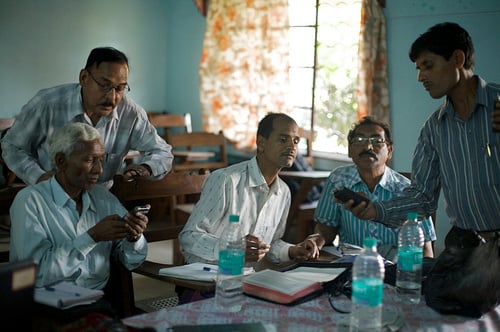
This is a guest post from Ed Weaver, CEO of T4 Global, a non-profit organization dedicated to communicating truth to oral cultures by distributing holistic, Christ-centered audio content. Thank you, Ed, for sharing your passion with us!
How will they know?
Orality. This is a term that is used frequently today in the world of missions. But what does it mean and why is it so relevant?
Many people in the world live in “oral cultures”, meaning that the vast majority of the population doesn’t read as their primary method of learning. Instead, they communicate important life information to each other in the form of story, song, drama, or poetry.
The Need
To some, this is hard to believe, so let’s describe how it breaks down*:
- 3 billion adults have low literacy or basic literacy skills
- 1.35 billion children are not at a level of education to be able to read
These numbers do not include those that prefer to learn through hearing stories, songs, dramas and poetry rather than via reading.
Thus the problem we face in communicating the Truth of the Word of God to oral cultures is that most of the resources—both human and financial—are dedicated to literate tools.
Those ministries engaged with “oral” tools find that when the “mother tongue” language is combined with a “mother style of communication,” the response from the people group can be amazing.
Not only is their birth language affirmed, their style of communication is affirmed and then we as missionaries have valued their culture, instead of westernizing it.
How to Do It
The key to oral culture ministry is to engage with indigenous leaders that have a heart to reach their people but may have struggled while attempting to minister to them in a western or literate style.
Define their spiritual need …
- Are they lost and need salvation?
- Are they believers in Jesus as the Son of God, but need to grow in their faith?
- Are they growing, but there are not enough leaders to guide them
Based on these answers, themes from the Word of God can be chosen by the indigenous leaders. Then oral learning materials can be crafted to communicate these truths. These materials include:
- Stories
- Songs
- Dramas
- Poetry
- Village proverbs
We then establish small listening groups—8 to 12 people—so that they can listen to the information. Afterward they are guided through a discussion in order to glean new "learnings" and apply these truths to their life … so that true transformation can take place.
Orality Ministry in Action
In partnership with New India Evangelistic Association and East-West, we trained listening group leaders in Bihar, India, to effectively guide a discussion.
During this hands-on training, we gathered 10–12 people that did not know Christ in a room to listen to some of the oral learning materials containing the creation story. The story, drama, and songs had been recorded in their mother tongue. One of the new trainees would then guide the listening and discussion of what they heard.
After the first time listening to the song, the group asked to listen again. These non-believers began singing it—including the phrase “God, what a wonderful creation you have made for me!”
Some of them changed their minds that day—in just 20 minutes—about how this world and man came into being. It’s a start!
East-West is honored to partner with T4 Global to reach the lost in relevant and creative ways.